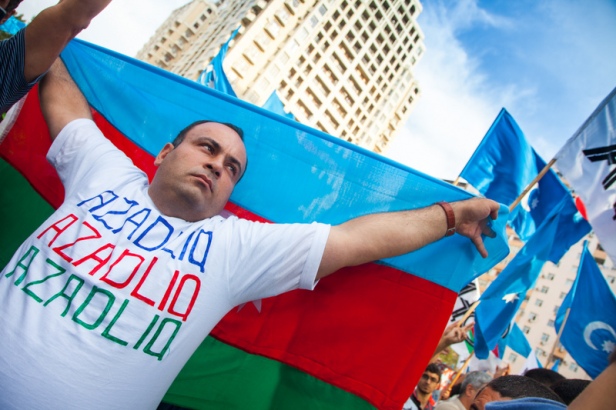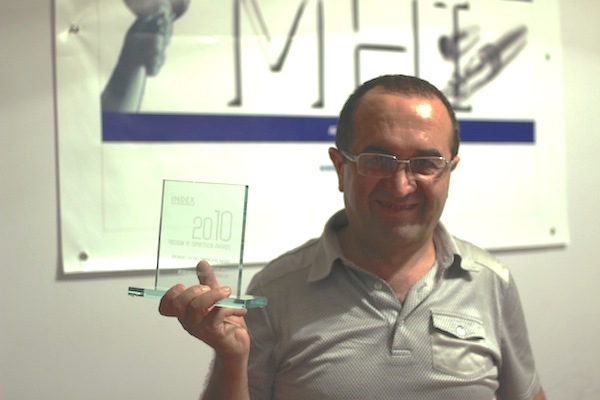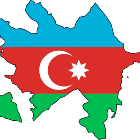Index relies entirely on the support of donors and readers to do its work.
Help us keep amplifying censored voices today.

An opposition protest in Baku, September 2013 (Image Demotix/Aziz Karimov)
The tone was set the day we arrived in Azerbaijan, 17 September 2013. Journalist Parviz Hashimli, was arrested and detained by officers of the Ministry of National Security after a raid on the office of newspaper Bizim Yol.
Hashimli is an influential journalist as the editor of Moderator.az website and chair of the Center for Protection of Political and Civil Rights. He was accused of drugs smuggling and the illegal possession of weapons. According to the Institute for Reporters’ Freedom and Safety (IRFS) in Baku, “it is unclear exactly what prompted the arrest of Hashimli and raid on BizimYol newspaper. However, some experts believe it was linked to a series of leaks reporting on developments in the state machinery, published shortly before his arrest on www.moderator.az news source.”
Human rights activists that we met believe that Hashimli’s arrest is yet another attempt to intimidate the press in the run-up to the October election. This week, the editor of Tolyshi Sado newspaper, Hilal Mamedov, was sentenced to five years in prison.
At least eight journalists are currently imprisoned in retaliation for their reporting on sensitive issues. This is the backdrop to Azerbaijan’s election next week, an election that is being fought in one of the least free countries on earth.
Journalists are not the only group affected by arrests under fabricated charges. Youth movements have been particularly targeted since March 2013. Index met with relatives of some of the seven NIDA members arrested last March and April for “drug possession” or “suspicion of inciting violence”. NIDA is a youth movement calling for more democracy in Azerbaijan. The seven members arrested were particularly active on social media and known for their criticism of the authorities.
On 19 September, we met former Index on Censorship award winner Rashid Hajili, who is a lawyer and chair of the Media Rights Institute. “Since 2003, the situation has gradually worsened,” says Hajili. While the human rights situation is deteriorating on the eve of the presidential elections, Hajili sees the situation as the result of a decade-long “shift toward authoritarianism”. Not only have the authorities of the country ignored their international commitments – such as decriminalising defamation – but they have adopted legislation imposing new restrictions on fundamental freedoms.

Rashid Hajili with his Index on Censorship Award (Image: Melody Patry)
In May, Azerbaijan’s parliament adopted regressive legislation extending criminal defamation provisions to online content. Azerbaijanis now face potential fines of up to AZN 1,000 (approximately USD $1,280), or prison sentences of up to three years for items they post online, including on Facebook. The chilling effect is so severe that individuals refrain from even “liking a friend’s controversial status”, says a young Azeri. “We are aware that social media are monitored,” she adds.
As the Aliyev regime tightens the screws, space for free expression is shrinking and prospects for free and fair elections grow slimmer. Three years after receiving Index’s Law and Campaigning Award, Rashid Hajili is still busy fighting repression against the right to freedom of expression in the country. The number of his clients prosecuted for being critical to the government keeps increasing. “There is very limited space for free expression,” says Hajili. “Many independent or critical voices go online, to online newspapers and to social media”. But the online space is not safe. While many in the civil society or international diplomacy have denounced criminal prosecutions for online publications, and intimidation of journalists, Azerbaijan routinely ignores criticism of its human rights record by international bodies.

Protesters face an extra three months in prison without trial. Padraig Reidy reports (more…)
The recent arrest of Ilkin Rustamzadeh highlights how Azerbaijan’s authorities use trumped up charges to silence messages they are not comfortable with, blogger Ali Novruzov writes from Baku.
On 17 May, Rustamzadeh, a university student and member of the “Free Youth” organisation, was arrested for a “Harlem Shake” video posted on YouTube. It did not matter that Rustamzadeh had no part in posting it or any of the other huge number of videos contributing to the viral dance meme.
Charged with hooliganism as well as disturbing public order for allegedly being involved with the video’s organisation, Rustamzadeh was immediately handed him two-month pre-trial detention. According to Rustamzadeh’s lawyer, investigators in the case have linked him to a “Harlem Shake” video filmed on Baku Boulevard.
While Rustamzadeh has not created viral videos, he has been active in a grassroots campaign calling for investigation into frequent Azerbaijani soldier deaths. In 2012, 97 people were killed, and between the start of this year and 23 April, there have been 29 deaths. The campaign has also been calling for the government to put more preventative measures in place.
The campaign’s activists have been targeted by the government with waves of arrests and a counter-campaign against members of the group. There have even been allegations made that this grassroots campaign is actually the work of external forces, like the National Democratic Institute.
Today on Index: Putin’s war on dissent in Russia | Free expression in the news
Student Competition
Think you have what it takes to be published by Index on Censorship? Here’s your chance to find out. Enter our blogging contest for a chance to win £100. More >>>
Index on Censorship Events
Caught in the web: how free are we online? June 10, 2013
The internet: free open space, wild wild west, or totalitarian state? However you view the web, in today’s world it is bringing both opportunities and threats for free expression. More >>>
The Index Award-winning Azerbaijani journalist Idrak Abbasov says he had been threatened by the family of a man who was arrested after an online posting, according to Institute for Reporters’ Freedom and Safety (IRFS).
“I interviewed Lankaran resident Shahin Agayev, whose daughter was beaten at school, on 14 January and posted it on the internet,” Abbasov told the IRFS.
Agayev was arrested on drug charges on 6 February and a verdict is expected to be announced soon. Abbasov says the charges are clearly false as Agayev “is really poor, he lives literally in a hut.”
Abbasov said that the man’s family blamed him for the arrest via a phone call on 13 May. The family representative told Abbasov that they had “an agreement with the police” that Agayev would be released if he stopped covering the story.
Subsequently, Abbasov reported to Index on Censorship that a man identifying himself as Agayev’s brother-in-law called and told him the police had demanded the original video, above, be deleted, despite widespread sharing.
Two days later, the man called Abbasov again — this time to arrange a meeting about a potential story.
“I have worked in Azerbaijan for long enough to understand it is a trap,” Abbasov said. Sources confirmed his suspicions. The plan had been to attack him during the meeting, potentially wounding or leaving him for dead.
“To protect myself I had to publicize the plan, and so far it has been quiet,” said Abbasov, who has been violently attacked for his work as an independent journalist.
Abbasov was named the Index on Censorship and Guardian journalism award winner 2012 for his investigative work.
More >>>
• Complete Coverage: Idrak Abbasov